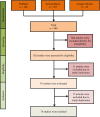Breast Cancer Management in the Era of Covid-19; Key Issues, Contemporary Strategies, and Future Implications
- PMID: 36733464
- PMCID: PMC9888303
- DOI: 10.2147/BCTT.S390296
Breast Cancer Management in the Era of Covid-19; Key Issues, Contemporary Strategies, and Future Implications
Abstract
During the COVID-19 pandemic, several priority diseases were not getting sufficient attention. Whilst breast cancer is a fatal disease affecting millions worldwide, identification and management of these patients did not initially attract critical attention to minimize the impact of lockdown, post-lockdown, and other measures. Breast cancer patients' conditions may not remain stable without proper care, worsening their prognosis. Proper care includes the timely instigation of surgery, systemic therapy, and psychological support. This includes low-and middle-income countries where there are already concerns with available personnel and medicines to adequately identify and treat these patients. Consequently, there was a need to summarize the current scenario regarding managing breast cancer care during COVID-19 across all countries, including any guidelines developed. We systematically searched three scientific databases and found 76 eligible articles covering the medical strategies of high-income countries versus LMICs. Typically, diagnostic facilities in hospitals were affected at the beginning of the pandemic following the lockdown and other measures. This resulted in more advanced-stage cancers being detected at initial presentation across countries, negatively impacting patient outcomes. Other than increased telemedicine, instigating neo-adjuvant endocrine therapy more often, reducing non-essential visits, and increasing the application of neo-adjuvant chemotherapy to meet the challenges, encouragingly, there was no other significant difference among patients in high-income versus LMICs. Numerous guidelines regarding patient management evolved during the pandemic to address the challenges posed by lockdowns and other measures, which were subsequently adopted by various high-income countries and LMICs to improve patient care. The psychological impact of COVID-19 and associated lockdown measures, especially during the peak of COVID-19 waves, and the subsequent effect on the patient's mental health must also be considered in this high-priority group. We will continue to monitor the situation to provide direction in future pandemics.
Keywords: COVID-19; breast cancer; guidelines; healthcare management; healthcare system; surgery; treatment; unintended consequences.
© 2023 Prodhan et al.
Conflict of interest statement
The authors report no conflicts of interest for this work and declare that they do not have any financial involvement or affiliations with any organization, association, or entity directly or indirectly with the subject matter or materials presented in this article. This also includes honoraria, expert testimony, employment, ownership of stocks or options, patents or grants received or pending, or royalties.
Figures
References
-
- World Health Organization. Weekly epidemiological update on COVID-19-10 August 2022; 2022. Available from: https://covid19.who.int/. Accessed January 20, 2023.
Publication types
LinkOut - more resources
Full Text Sources



